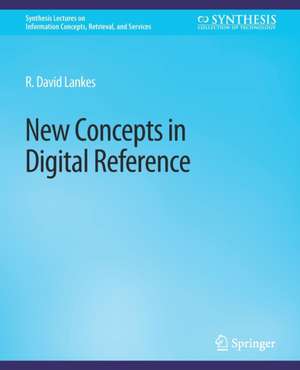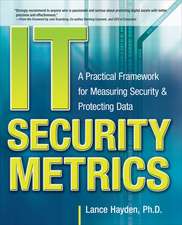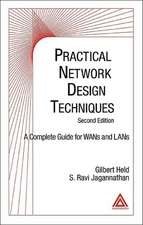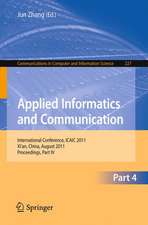New Concepts in Digital Reference: Synthesis Lectures on Information Concepts, Retrieval, and Services
Autor R. David Lankesen Limba Engleză Paperback – mar 2009
| Toate formatele și edițiile | Preț | Express |
|---|---|---|
| Paperback (2) | 135.99 lei 6-8 săpt. | |
| Springer International Publishing – mar 2009 | 135.99 lei 6-8 săpt. | |
| Morgan & Claypool – 15 mar 2009 | 238.48 lei 6-8 săpt. |
Din seria Synthesis Lectures on Information Concepts, Retrieval, and Services
- 20%
 Preț: 167.70 lei
Preț: 167.70 lei - 20%
 Preț: 301.96 lei
Preț: 301.96 lei - 20%
 Preț: 165.96 lei
Preț: 165.96 lei - 20%
 Preț: 278.44 lei
Preț: 278.44 lei - 20%
 Preț: 529.64 lei
Preț: 529.64 lei - 20%
 Preț: 276.80 lei
Preț: 276.80 lei - 20%
 Preț: 224.97 lei
Preț: 224.97 lei - 20%
 Preț: 165.44 lei
Preț: 165.44 lei - 20%
 Preț: 177.81 lei
Preț: 177.81 lei - 20%
 Preț: 358.95 lei
Preț: 358.95 lei - 20%
 Preț: 298.43 lei
Preț: 298.43 lei - 20%
 Preț: 237.93 lei
Preț: 237.93 lei - 20%
 Preț: 163.24 lei
Preț: 163.24 lei - 20%
 Preț: 199.72 lei
Preț: 199.72 lei - 20%
 Preț: 167.08 lei
Preț: 167.08 lei - 20%
 Preț: 298.64 lei
Preț: 298.64 lei - 20%
 Preț: 176.97 lei
Preț: 176.97 lei - 20%
 Preț: 222.03 lei
Preț: 222.03 lei - 20%
 Preț: 328.79 lei
Preț: 328.79 lei - 20%
 Preț: 225.15 lei
Preț: 225.15 lei - 20%
 Preț: 199.72 lei
Preț: 199.72 lei - 20%
 Preț: 163.24 lei
Preț: 163.24 lei - 20%
 Preț: 304.96 lei
Preț: 304.96 lei - 20%
 Preț: 183.73 lei
Preț: 183.73 lei - 20%
 Preț: 224.18 lei
Preț: 224.18 lei - 20%
 Preț: 163.24 lei
Preț: 163.24 lei - 20%
 Preț: 167.08 lei
Preț: 167.08 lei - 20%
 Preț: 163.24 lei
Preț: 163.24 lei - 20%
 Preț: 227.62 lei
Preț: 227.62 lei - 20%
 Preț: 298.43 lei
Preț: 298.43 lei - 20%
 Preț: 177.62 lei
Preț: 177.62 lei - 20%
 Preț: 137.45 lei
Preț: 137.45 lei - 20%
 Preț: 163.24 lei
Preț: 163.24 lei - 20%
 Preț: 360.48 lei
Preț: 360.48 lei - 20%
 Preț: 177.47 lei
Preț: 177.47 lei - 20%
 Preț: 121.91 lei
Preț: 121.91 lei - 20%
 Preț: 199.72 lei
Preț: 199.72 lei - 20%
 Preț: 327.62 lei
Preț: 327.62 lei - 20%
 Preț: 223.67 lei
Preț: 223.67 lei - 20%
 Preț: 355.44 lei
Preț: 355.44 lei - 20%
 Preț: 289.61 lei
Preț: 289.61 lei - 20%
 Preț: 210.63 lei
Preț: 210.63 lei - 20%
 Preț: 163.24 lei
Preț: 163.24 lei - 20%
 Preț: 177.47 lei
Preț: 177.47 lei - 20%
 Preț: 358.20 lei
Preț: 358.20 lei - 20%
 Preț: 223.67 lei
Preț: 223.67 lei - 20%
 Preț: 270.99 lei
Preț: 270.99 lei
Preț: 135.99 lei
Preț vechi: 169.98 lei
-20% Nou
Puncte Express: 204
Preț estimativ în valută:
26.03€ • 28.28$ • 21.88£
26.03€ • 28.28$ • 21.88£
Carte tipărită la comandă
Livrare economică 21 aprilie-05 mai
Preluare comenzi: 021 569.72.76
Specificații
ISBN-13: 9783031011313
ISBN-10: 3031011317
Ilustrații: VIII, 63 p.
Dimensiuni: 191 x 235 mm
Greutate: 0.14 kg
Editura: Springer International Publishing
Colecția Springer
Seria Synthesis Lectures on Information Concepts, Retrieval, and Services
Locul publicării:Cham, Switzerland
ISBN-10: 3031011317
Ilustrații: VIII, 63 p.
Dimensiuni: 191 x 235 mm
Greutate: 0.14 kg
Editura: Springer International Publishing
Colecția Springer
Seria Synthesis Lectures on Information Concepts, Retrieval, and Services
Locul publicării:Cham, Switzerland
Cuprins
Defining Reference in a Digital Age.- Conversations.- Digital Reference in Practice.- Digital Reference an a New Future.- Conclusion.
Notă biografică
R. David Lankes is director of the Information Institute of Syracuse and an associate professor in Syracuse University’s School of Information Studies. Lankes has always been interested in combining theory and practice to create active research projects that make a difference. Past projects include the ERIC Clearinghouse on Information and Technology, the Gateway to Education Materials, AskERIC, and the Virtual Reference Desk. Lankes’ more recent work involves how participatory concepts can reshape libraries and credibility. This work expands his ongoing work to understand the integration of human expertise in information systems. Lankes is a passionate advocate for libraries and their essential role in today’s society. He also seeks to understand how information approaches and technologies can be used to transform industries. In this capacity, he has served on advisory boards and study teams in the fields of libraries, telecommunications, education, and transportation, including at the National Academies. He has been appointed as a visiting fellow at the National Library of Canada, the Harvard School of Education, and the first fellow of American Library Association’s Office for Information Technology Policy.











